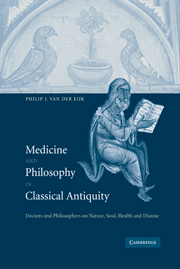 Medicine and Philosophy in Classical Antiquity
Medicine and Philosophy in Classical Antiquity Book contents
- Frontmatter
- Contents
- Acknowledgements
- Note on translations
- Note on abbreviations
- Introduction
- I HIPPOCRATIC CORPUS AND DIOCLES OF CARYSTUS
- 1 The ‘theology’ of the Hippocratic treatise On the Sacred Disease
- 2 Diocles and the Hippocratic writings on the method of dietetics and the limits of causal explanation
- 3 To help, or to do no harm. Principles and practices of therapeutics in the Hippocratic Corpus and in the work of Diocles of Carystus
- 4 The heart, the brain, the blood and the pneuma: Hippocrates, Diocles and Aristotle on the location of cognitive processes
- II ARISTOTLE AND HIS SCHOOL
- III LATE ANTIQUITY
- Bibliography
- Index of passages cited
- General index
4 - The heart, the brain, the blood and the pneuma: Hippocrates, Diocles and Aristotle on the location of cognitive processes
Published online by Cambridge University Press: 22 September 2009
- Frontmatter
- Contents
- Acknowledgements
- Note on translations
- Note on abbreviations
- Introduction
- I HIPPOCRATIC CORPUS AND DIOCLES OF CARYSTUS
- 1 The ‘theology’ of the Hippocratic treatise On the Sacred Disease
- 2 Diocles and the Hippocratic writings on the method of dietetics and the limits of causal explanation
- 3 To help, or to do no harm. Principles and practices of therapeutics in the Hippocratic Corpus and in the work of Diocles of Carystus
- 4 The heart, the brain, the blood and the pneuma: Hippocrates, Diocles and Aristotle on the location of cognitive processes
- II ARISTOTLE AND HIS SCHOOL
- III LATE ANTIQUITY
- Bibliography
- Index of passages cited
- General index
Summary
THE DEBATE IN ANTIQUITY ON THE LOCATION OF THE MIND: ORIGIN, DEVELOPMENT AND MISREPRESENTATION
In one of the first chapters of his systematic account of the treatment of acute and chronic diseases, the Latin medical author Caelius Aurelianus (fifth century ce) discusses phrenitis, a psychosomatic disorder with symptoms including acute fever, mental confusion, a weak and fast pulse and various forms of abnormal behaviour such as the picking of threads out of clothing. Caelius Aurelianus, himself belonging to the medical school called the Methodists, begins his argument, as usual, with a survey of the views on the nature and origin of this disease held by doctors belonging to other schools of thought, in particular their views on the question of which part of the body is affected by the disease. His main reason for doing so is to show the contrast between his own and only correct treatment of the disease and the general confusion among other doctors:
What part [of the body] is affected in phrenitis? This question has been raised particularly by leaders of other sects so that they may apply their treatments according to the different parts affected and prepare local remedies for the places in question … Now some say that the brain is affected, others its fundus or base, which we may translate sessio [‘seat’], others its membranes, others both the brain and its membranes, others the heart, others the apex of the heart, others the membrane which incloses the heart, others the artery which …
- Type
- Chapter
- Information
- Medicine and Philosophy in Classical AntiquityDoctors and Philosophers on Nature, Soul, Health and Disease, pp. 119 - 136Publisher: Cambridge University PressPrint publication year: 2005
- 4
- Cited by


